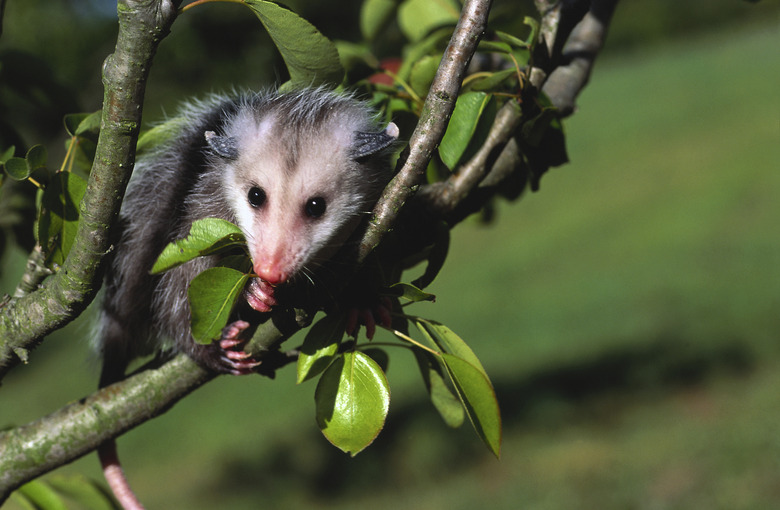The Dangers Of Opossums
When you spot these stout and slow-moving marsupials roaming your yard at night, you might wonder "Are opossums dangerous?" These mammals can pose a minor danger to humans in some cases and potentially cause a mild nuisance to homeowners or farmers. However, opossums have a bad reputation and generally do little-to-no harm – and plenty of good!
Are Opossums Dangerous?
Are Opossums Dangerous?
Like nearly any animal, opossums can be dangerous if threatened. Though they can bite, in most cases these creatures simply hiss, attempt to flee or play dead when confronted by people or pets. The primary concern when it comes to interacting with opossums is their potential to spread disease.
A zoonotic disease is a disease that can spread from animals to humans. The most prevalent zoonotic disease in opossums is leptospirosis. This bacteria spreads via the urine and feces of the opossum and can infect humans and pets. Opossums can also potentially carry tuberculosis, coccidiosis, Chagas disease, toxoplasmosis, spotted fever and trichomoniasis.
Do Opossums Carry Rabies?
Do Opossums Carry Rabies?
Despite common misconception, it's extremely unusual for opossums to carry rabies. Though it isn't impossible, most opossums have a natural resistance to rabies because they have a lower body temperature than other mammals do. The vast majority of rabies cases in the United States consist of infections in raccoons, bats, foxes and skunks.
Opossums as a Nuisance
Opossums as a Nuisance
Though they do not typically carry rabies, opossums do pose a nuisance to humans in some cases. They have the potential to spread some diseases to humans or pets. As omnivores, these marsupials feed on both plants and animals, so they can steal fruits and vegetables from gardens or get into unsecured garbage. You might also find an opossum hiding in your chicken coop, as they'll feed on eggs and sometimes on poultry as well.
Discouraging and Repelling Opossums
Discouraging and Repelling Opossums
The best way to keep opossums out of your yard is to ensure they do not have a food source to feed on. Opossums often eat dog or cat food that has been left outside, so be sure to clean up any leftover pet food every evening. You should also make sure to secure your garbage with a well-fitting lid. Finally, you should properly secure chicken coops and runs against predators. Chicken wire usually provides enough deterrent to keep opossums away from poultry but does not secure them against raccoons, coyotes or foxes.
Opossums Benefits: Diet
Opossums Benefits: Diet
Before going to the extent of removing opossums, you should understand all the benefits they provide when they live in your area. Opossums often feed on small rodents, suppressing their populations in the area. While shambling along the ground they also collect ticks. Instead of feeding on the opossum and dropping off to later infect your dog or other wildlife, opossums eat nearly every tick they encounter and prevent ticks from infecting other animals.
Though opossums can potentially spread disease, their habit of feeding on ticks also helps stop the spread of tick-borne diseases such as Lyme disease. On top of their disease-stopping benefits from eating ticks, they also eat carrion, further halting the spread of disease.
Opossums Benefits: Venom Resistance
Opossums Benefits: Venom Resistance
The dietary benefits of opossums don't stop at ticks, pests and carrion. These marsupials also eat snakes when presented with the opportunity. Opossums have a natural immunity to some types of snake venom, meaning that they can feed on and reduce the populations of certain venomous snakes.
This resistance to snake venom might also directly help humans as well. Researchers have identified a specific molecule, or peptide, in opossum blood that neutralizes snake venom. By isolating this peptide, researchers hope to provide an affordable and universal antivenom across the globe.
References
- Animal Diversity Web: Virginia Opossum
- Connecticut Department of Energy and Environmental Protection: Virginia Opossum
- UC IPM: Opossum
- National Geographic: Opossums Could Hold the Key to Saving Snakebite Victims
- Mosquito Squad: The Tick Eating Power of the Opossum
- Cary Institute of Ecosystem Studies: Why You Should Brake for Opossums
- Wildlife Medical Clinic at Illinois: Opossums
- Centers for Disease Control and Prevention: Animals and Rabies
Cite This Article
MLA
Zinni, Yasmin. "The Dangers Of Opossums" sciencing.com, https://www.sciencing.com/dangers-opossums-12044960/. 30 September 2021.
APA
Zinni, Yasmin. (2021, September 30). The Dangers Of Opossums. sciencing.com. Retrieved from https://www.sciencing.com/dangers-opossums-12044960/
Chicago
Zinni, Yasmin. The Dangers Of Opossums last modified March 24, 2022. https://www.sciencing.com/dangers-opossums-12044960/
